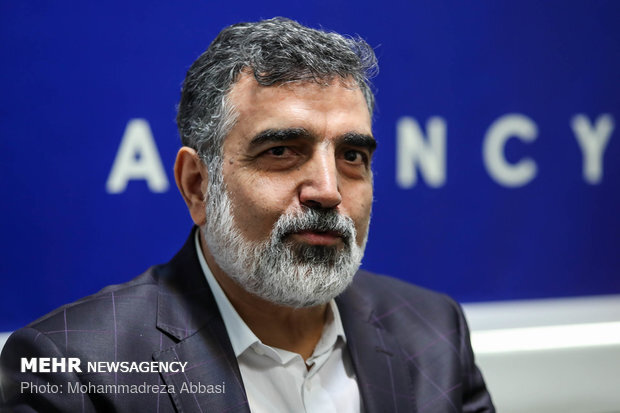Iran says to advance nuclear program with more determination

TEHRAN — The spokesman for the Atomic Energy Organization of Iran (AEOI) has said Iran will advance its nuclear program with more determination, describing as “worthless” and “ineffective” the recent U.S. sanctions on AEOI Chief Ali Akbar Salehi.
“The Americans attempt to create a psychological atmosphere, but in reality, they will not achieve any success,” Behrooz Kamalvandi said on Sunday, pointing to the recent sanctions which also target the AEOI itself.
“The Americans do not have a correct understanding of the conditions and atmosphere of the Islamic Republic of Iran, and basically, they not only lack a correct understanding of Iran, but also lack a correct understanding of major international issues,” Kamalvandi said.
He continued, “That’s why they take measures in the political sphere that are strange and also ineffective.”
The AEOI spokesman further pointed to the sanctions against Salehi, saying since the AEOI chief does not have assets in the United States, the sanctions are futile in practice.
He also said Iran’s nuclear program will not be shaped according to other countries’ measures and policies. “We will do whatever is in the country’s interests.”
The U.S. Treasury Department announced on Thursday that Washington has imposed sanctions on the atomic organization and its chief, Salehi.
However, sources said the U.S. will once again waive its sanctions on Russian, Chinese and European firms that work at four Iranian nuclear facilities, Press TV reported, citing Reuters.
The U.S. Treasury will issue waivers to sanctions that bar non-U.S. firms from dealing with the AEOI, the sources told Reuters on condition of anonymity.
The waivers will allow those countries to continue working at the heavy water reactor in Arak, the Fordow enrichment facility, the Bushehr nuclear power plant and the Tehran research reactor.
Speaking to Fars on Thursday, Kamalvandi said the move only reflects Washington’s desperation.
Kamalvandi also reacted to remarks by Brian Hook, the U.S. special representative for Iran, who has claimed that Washington has sanctioned the AEOI and its chief because Iran had started new violations of its 2015 nuclear agreement with the remaining parties.
Given its withdrawal from the deal and its violation of its commitments, the U.S. “is in no position” to comment on the manner in which Iran adheres to its nuclear obligations, the spokesman pointed out.
U.S. President Donald Trump unilaterally quit the nuclear deal in May 2018 and introduced the harshest ever sanctions in history on Iran as part of his administration’s “maximum pressure” strategy against Iran.
In response to this move, on May 8, 2019, Iran announced that its “strategic patience” is over and started to gradually reduce its commitments to the JCPOA at bi-monthly intervals. At the time Iran announced if the European parties to the deal take concrete steps to shield Iran’s economy from the U.S. sanctions it will reverse its decision.
However, seeing no action by the Europeans, on January 5 Iran took the last and final step by removing all limits on its nuclear activities.
Iran’s moves are based on paragraph 36 of the JCPOA which “allows one side, under certain circumstances, to stop complying with the deal if the other side is out of compliance.”
Despite taking the last step, Iran has reminded the Europeans to fulfill their commitments in order to keep the deal alive.
France, Germany and the United Kingdom, three parties to the nuclear deal, issued a joint statement on January 14, announcing they have formally triggered the dispute mechanism that may lead to the snapback of UN sanctions against Iran.
MH/PA
Leave a Comment